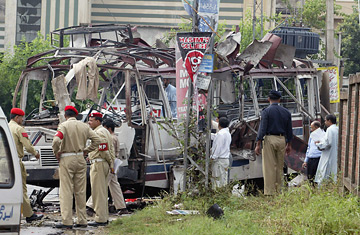
Security officials examine a bomb-damaged bus in Rawalpindi.
Two suicide bombers struck at the heart of Pakistan's military establishment on Tuesday in the garrison town of Rawalpindi, just 7 miles (11.3 km) from the capital of Islamabad. Some 66 people were injured and 24 killed, bringing the number of dead by militant violence in Pakistan to at least 243 people since a military strike against an extremist mosque in the capital killed 102 people in July.
Both blasts were within a mile of the Pakistani Military Headquarters, where President General Pervez Musharraf lives. One took place at a busy intersection just outside a military housing playing field, the other in a small civilian market across the street from an army depot. These attacks highlight growing instability in Pakistan, just as Musharraf prepares for a highly contested presidential election that could see the end of the military leader's eight-year tenure heading the country.
Ahsan Ahsan, the owner of a CNG fueling station that lies across the street from the site of the first explosion, says he arrived at work just a half hour after a suicide bomber stepped onto a government bus ferrying Pakistan defense department employees to work. The force of the bomb was enough to sever electrical lines, disrupt phone services and shatter the mirrored plate-glass doors of Ahsan's office. His driveway was littered with "pieces of bodies," he says, but fortunately the explosion and subsequent fire did not ignite the wall of gas canisters he stores on the premises. "It was very dangerous. Thanks be to God that the bus was far enough away."
At that time of the morning the bus, which follows a regular route every day, was only partially filled. Approximately a dozen defense department employees were already on board and another dozen were waiting to get on. It was then that the suicide bomber struck, according to military spokesman Major General Wahid Arshad. The bomber pushed his way onto the bus, detonating himself and blowing the roof off the vehicle.
So far, no one has claimed responsibility for the bombings, though ongoing upheavals in Pakistan's lawless tribal areas have led many to speculate that they are related to growing frustration and anger by Taliban-inspired militants who have been embroiled in an increasingly violent insurgency for the past 18 months. Nearly a year ago, Pakistan's military, unable to subdue the insurgency, signed a peace treaty with the militants, but that treaty broke down this summer over a series of strikes against terrorist targets in the border lands between Pakistan and Afghanistan. Just last week, militants in South Waziristan took around 300 soldiers and security personnel hostage, demanding the withdrawal of troops from the tribal areas in addition to the release of 15 detained insurgents.
The military has become increasingly unpopular in recent months, not only with the tribal militants but also amongst ordinary Pakistanis who resent the military's dominance in government and civilian affairs. While onlookers at today's explosion lamented the loss of life, burgeoning resentment of the military colored even the experiences of victims and eyewitnesses. Irshan Mehdi, a 42-year-old shopkeeper from Rawalpindi, had been overtaking the bus just as it blew up. "Suddenly I heard a huge sound, and my car collapsed. My children were screaming. The street was filled with injured people." Pakistanis have great respect for the army, says Mehdi, "because they are supposed to protect us. But today the military only came to rescue their own, they took them to the hospital, but they didn't help the civilians at all, they didn't even offer help." The fake leopard-skin seat covers of his battered Suzuki compact were littered with the broken glass of all four windows and his windshields. "I am unhappy," he says. "They should have at least offered to repair my car."
